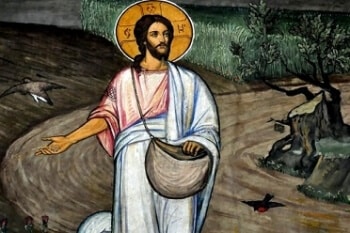 Both of the readings for Mass today are about sowing seeds. It’s really pretty awesome the way that Christ used images of everyday things, to tell a story that would stick in a person’s mind. Back in his time, the average person couldn’t read, but Jesus found a way to teach certain principles in the spiritual life, in a way that the people would remember. He went to where they were at, physically, intellectually and spiritually, using everyday things from their lives that they could all relate to.
Both of the readings for Mass today are about sowing seeds. It’s really pretty awesome the way that Christ used images of everyday things, to tell a story that would stick in a person’s mind. Back in his time, the average person couldn’t read, but Jesus found a way to teach certain principles in the spiritual life, in a way that the people would remember. He went to where they were at, physically, intellectually and spiritually, using everyday things from their lives that they could all relate to.
Isn’t it just amazing how Jesus was able to relate to them on their level? Even though the people may not have understood the parables immediately, that too, may have been part of his plan. Their lack of understanding may have caused many of them to go home and think about what he said, and what he could have meant by it? Maybe it caused them to discuss it among themselves, and ask their neighbor what they thought he meant? The parables were a seed of thought that Jesus planted in their mind and heart. It got their attention, and made them think about what it might mean in their own life. This is still true today. The parables are like precious diamonds, they are timeless and continue to endure to this day.
We have heard the parable of the sower and the seed many times, if we have been a Catholic for very long. Every three years, the cycle of readings for Mass starts over again. In thirty years, we will have heard this parable ten times, yet it remains ever fresh, ever new, and its meaning changes a bit to the current circumstances in our lives.
The seed is the word of God that is sown in the world. Jesus told us how many things in life happen to distract us from actually living out the word of God in our lives. Each stage he talks about, could be stages in our own life.
In the first verse, the faith was lost almost immediately on the path (just starting out in life?)
The second verse took root in joy but had no root and didn’t last (maybe our teenage or young adult years? Especially since he spoke of temptation?)
The third verse is the seed that fell among thorns, choked by anxieties, riches and pleasures, which failed to produce mature fruit (the prime of our life?)
And the fourth verse spoke about the seed that fell on good soil, that bore fruit through perseverance (our old age?)
So, according to the Lord, we have different dangers that we face, at different stages of our life. If we continue to persevere and pass through these danger zones, we will have passed through the temptations and distractions and produce good fruit. The good fruit of our marriages, families, friendships, and the people we shared our faith with, so that we bring others to the Lord too. It isn’t enough to just bring ourselves. We are not fruit. We are seeds. Seeds multiply.
Have you ever thought of yourself as a seed in the spiritual life? You have the ability to plant seeds of faith, love, hope and charity in the lives of all those you come in contact with during your life too. There are other ways to sow seeds too. To try and think with the mind and heart of Jesus, and our Holy Mother Church. Is there something in your community that you’ve ever noticed and did not act on, that Jesus would want to see done? A dark crevice, a crack that has been overlooked?
Do people visit the jails and prisons in your community? Do the elderly or sick spent most of their time alone? Do you know someone that doesn’t have very much food? Sometimes people are too proud to let anyone know they need help. Many things are beyond our reach to do on a large scale, but there are always small things we can do. Even if the problem is too big to personally tackle, then maybe we could be the one to plant the seeds of thought in other people, who have the ability, or the resources to help a particular situation.
The problem is that so many of us spend our lives worrying too much about things we can’t control, pursuing money as the real security of our lives, or simply trying to live comfortable, enjoyable lives. The problem with this is that we sometimes do not notice the needs of other people who are right in front of us the whole time. This can even happen within our own family sometimes too, if we aren’t careful.
We are supposed to bear fruit, but like Saint Paul said in today’s first reading for Mass, “What you sow is not brought to life unless it dies.” Fruit dies to itself, in order to bear much more fruit than just itself. We overcome our selfishness a little at a time (or die to ourselves), in order to manifest Christ’s love to other people. We will build the Kingdom of God, with acts of love.
Daily Mass Readings:
1 Corinthians 15: 35-37, 42-49 / Psalm 56 / Luke 8: 4-15
